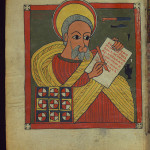We run our website the way we wished the whole internet worked: we provide high quality original content with no ads. We are funded solely by your direct support. Please consider supporting this project.

What is the Kingdom of God (Part 1)
We all know what the Kingdom of God is, right? But this is precisely the problem. Since we are all to a large extent products of our culture, what seems obviously true and right to us will be at least influenced, if not determined, by what seems obviously true and right to our culture. This, I suspect, is why the American church today Christianizes so much of American culture. We give this culture divine authority by slapping the label “Kingdom of God” or “Christian” on it.
A classic case of this is seen in the history of America at war. Instead of simply claiming America should be at war because they think it’s “just” or “in the best interest of our nation,” many Christians, especially Christian leaders, invoke God’s name. The long and bloody history of war has shown that it’s hard to motivate young people to risk getting killed and to kill others unless you can convince them that their tribal god wants them to do it and that he’s on their side. “We fight for god and country” has been the battle cry of pretty much every army throughout history.
We should expect this sort of activity from the fallen kingdoms of the world. But when Christians fuse the Kingdom of God with nationalistic tribalism, the result is catastrophic. The crucified Messiah becomes just one more typical tribal warring deity.
In the name of the one who taught us to bless those who persecute us, we engage in preemptive strikes against those who might threaten us at some point in the future. In the name of the one who commanded us to turn the other cheek when struck, we make sure that we strike their cheek first. In the name of the one who taught us to love our enemies, we bomb them. In the name of the one who was crucified for wrong doers, we crucify those who wrong our national interests.
We need to understand that this idolatrous fusion of the Kingdom of God with nationalistic self-interest is the most common form of idolatry practiced throughout church history. It’s the mindset that fueled the Crusades and the Inquisition. It’s why the history of the church is as bloody as that of any barbaric nation. The fusion of the Kingdom of God with nationalistic self-interest is diabolically tempting precisely because it seems so “obviously right” to those who are part of the nation.
I’m not here to discuss the relative merits of any war. But for God’s sake—literally—don’t pollute the holy name of the crucified Messiah by associating him with violent nationalistic sentiments! The “holiness”—the separateness—of Jesus Christ and the Kingdom he came to establish is desecrated when it’s even remotely associated with this all-too-typical, bloody, kingdom-of-the-world activity.
Before we get into what the Kingdom of God is, we must first refrain from infusing it with every personal, cultural or nationalistic sentiment we happen to feel and that seems “obviously” right to us. When we do this we delude ourselves into thinking we’re advancing the Kingdom of God when, in fact, we’re only advancing our own personal or national self-interest. We “Christianize” our cultural conditioning and become guilty of grotesque idolatry. All of this results from assuming the Kingdom of God is obvious.
The truth is that there’s nothing obvious about the Kingdom of God. In fact, if we allow Scripture to tell us something we don’t assume we already know, we’ll see that the meaning of the Kingdom of God contradicts the most “obvious” truths of our culture and every culture. As is typical, instead of giving us an abstract definition of the Kingdom of God, Scripture gives us a narrative. It is the narrative that is centered on the person of Jesus Christ.
Throughout the Gospels, Jesus is depicted as the perfect embodiment—the incarnation—of “the Kingdom of God.” When Jesus was present, Scripture shows, the Kingdom of God was present. He was, in his incarnate form, the dome in which God was king—the Kingdom of God. According to the New Testament’s story, Jesus planted the mustard seed of the Kingdom with his ministry, death and resurrection. He then gave to the Church, the gathering of all who submit to Christ’s lordship, the task of embodying, living out and expanding this unique Kingdom.
Stay tuned as over the next few days we will be exploring what this means for us as the church and for us as individuals.
Image by Thomas Hawk via Flickr
Category: General
Tags: Holiness, Jesus, Kingdom, Kingdom Living, National Idolatry, Upside-Down Kingdom, War
Topics: Following Jesus
Related Reading

The Jesus Seminar and the Reliability of the Gospels
The Jesus Seminar The primary driving force behind the popular media’s present preoccupation with liberal views of Jesus has been the Jesus Seminar. This Seminar, first convened in 1985 by Robert Funk, is a gathering of 100 or so mostly liberal New Testament scholars who meet on a regular basis. They have determined, by a…

Loving a Twilight Zone God?
David D. Flowers posted this insightful reflection over on his blog about an episode of The Twilight Zone and what it says about some pop views of God. Can we really love a God that exercises this kind of random control just because he can? We can certainly fear a God like this, but can…

The Revelation of God in the Cross
The cross cannot be understood apart from the resurrection, just as the resurrection can never be understood apart from the cross. They are two sides of the same coin. If you consider the cross apart from the resurrection, then the crucified Christ becomes nothing more than one of the many thousands of people who were…

On Driving and Unsurpassable Worth
Our friends the Livesay’s live and work in Haiti, and their blog is amazing. They posted a reflection today entitled On Driving and Unsurpassable Worth. It’s so worth reading. From the article: Annoyed with someone? Repeat after me: Unsurpassable worth, unsurpassable worth… Unsurpassable worth. Fine, be annoyed … but if keeping the annoyance from turning to rage…

The Wrong “Bulls-Eye”: Reflections on the “Christian Left”
As it has since the fourth century, the Church today for the most part operates with a Constantinian (“power-over”) paradigm. Because of this, most socially concerned Christians are inclined to define the Church’s mission as adjudicating between and tweaking political options “in Jesus’ name.” We accept Caesar’s definition of “power” as the ability to get…

Are the Gospels Historical Fiction?
Some scholars today argue that the stories recorded in the Gospels are actually intentional fabrication. In essence, they argue that Mark took Paul’s theology and robed the story of Jesus in a fictitious historical narrative. The other Gospels followed suit. The argument is clever and removes the difficulty of explaining how a legend of a…
